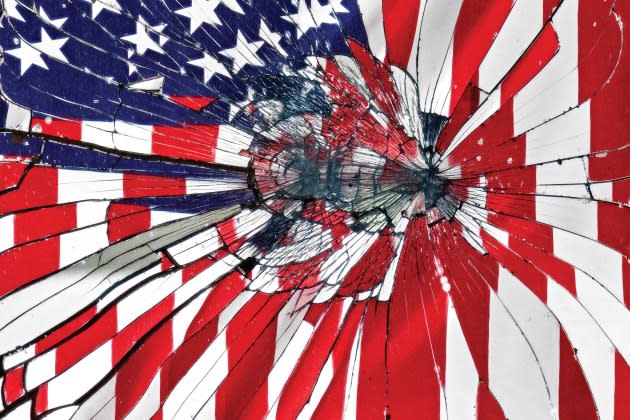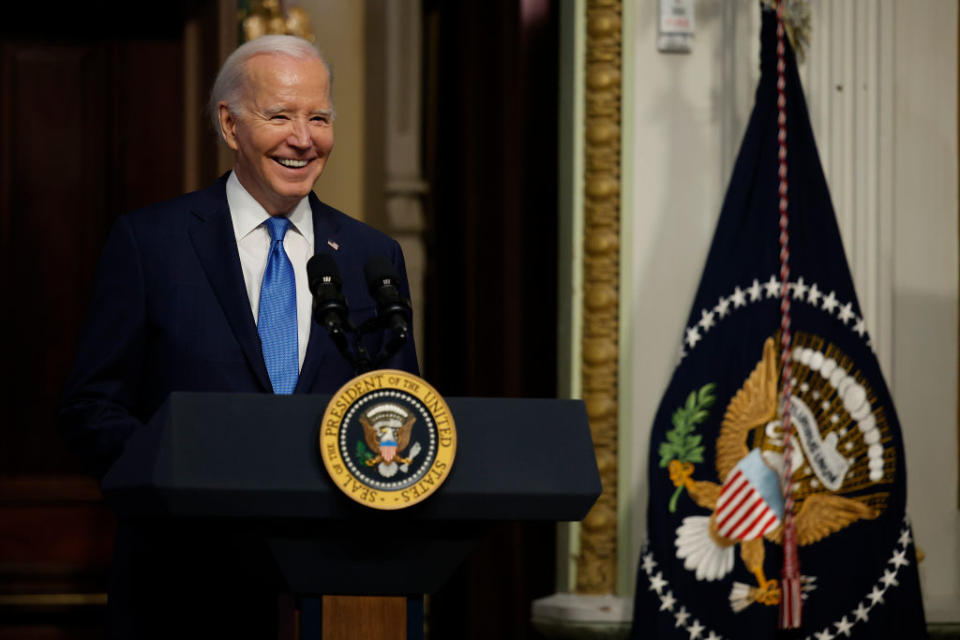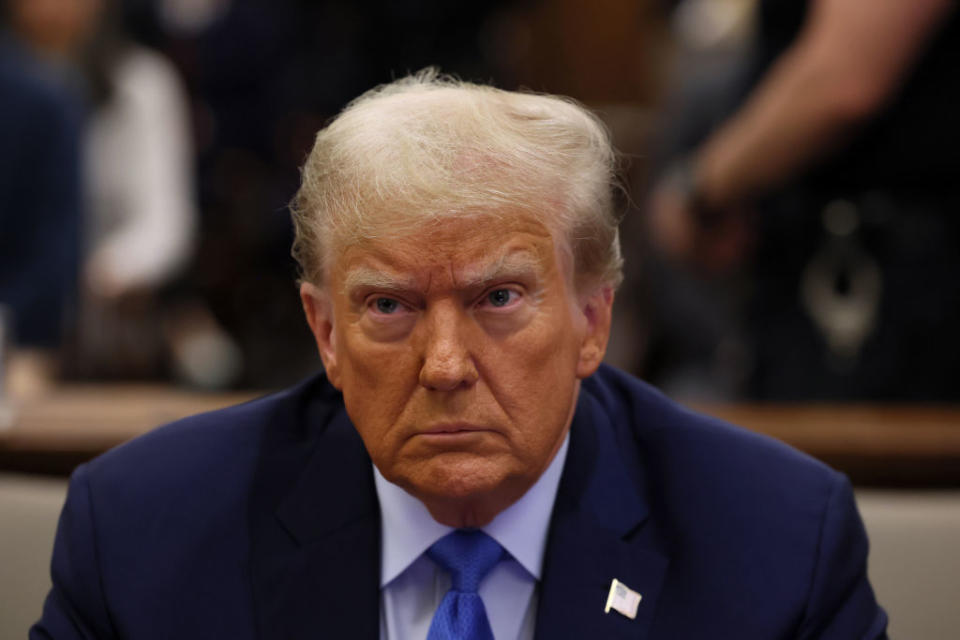What to Watch: Surviving an Election Year on Edge

Election years are always tricky.
Consumers are bombarded with nonstop marketing even before politicians muscle in and vie for attention span with rallies, social media posts, robocalls and more. Even in a good year, it becomes just that much harder for fashion brands to get their message across.
More from WWD
But 2024 is different — and more difficult.

The nation is more divided, the rhetoric uglier and everything feels more dangerous. The animating fire in the election this year is not tax policy or some sense of likability. This is not a matter of whether you’d rather have a beer with Joe Biden or Donald Trump.
This is expected to be more of a drop-down, drag-out fight over the future of American democracy that could decide whether the 335 million people who make up the world’s most powerful economy can even begrudgingly get on the same page.
More in What to Watch: Financial
A Retail Stock Revival After a Shaky Year?
Tapestry, Capri and the New Competitive Landscape
Tiptoeing Into a Soft Landing
Surviving an Election Year on Edge
Italy’s Potential IPOs, M&As in 2024
Consumers or fashion — or even the economy — might not be the most important thing at stake in that fight, but they will all be impacted.
For starters, fashion’s chief executive officers will have to decide if, when and how they are willing to get involved in any of the back and forth — or what to do when they are simply swept away in it.
“I’m going to the next year with a great deal of apprehension,” said Mark Lipton, adviser to CEOs and boards and professor emeritus at the Parsons School of Design and The New School. “I can’t even fake a crystal ball. Firms will be getting into such uncharted territory where there’s little or no history of what’s going to happen. How do we react? It’s going to be such a food fight.”
While fashion and retail brands have tried to find their voice on social and more political issues in recent years, it’s hard to be pitch perfect.
Ask Target Corp., which has had a Pride collection for years, but found that this summer it was greeted with threats and protests, with critics zeroing in on its tuck-friendly swimwear. The company pulled some items in the interest of safety even as pro-Pride groups pushed for the retailer to not give in to “bullies.”
It was a damned-if-you-do, damned-if-you-don’t kind of situation that other companies could get stuck in as the political and social rhetoric heats up and America goes just a little off-kilter.
“This is like a third rail,” said Lipton, who had simple advice for CEOs who are sure they know what their consumers’ priorities are.
“Stay out of it,” he said. “This is going to be an incendiary, no-holds-barred political environment. Even if you’ve got it right in terms of your market’s preferences, don’t go there. The pundits will use it against you.”
If companies do get caught up in the fray, the best way to keep from being carried away might be to have a strong base, anchored by deeply held values.
“You need to be telling your public what you stand for, values that direct and guide your beliefs,” Lipton said.
One good example is Patagonia (which is a good example for lots of things). The eco-friendly brand is widely seen as walking the walk and talking the talk and, so, has a kind of permission to engage on its topics.
“At this point, they can do whatever they want, in part because they have been so consistent in their messaging,” Lipton said.
But consultant Jonathan Low, a partner at Predictiv who specializes in the financial impact of intangibles like brand, predicted it’s going to be nearly impossible to avoid controversy altogether.
“It looks like the only person who has been able to circumvent this is Taylor Swift,” Low said. “She’s pretty much come out and said she’s for Joe Biden and she’s attacked by right-wing media and 50 million of her fans go, ‘Who … are you? We’re with Taylor.’ She’s obviously the exception.”
For retailers, he said: “It’s out of your hands. Your public relations specialist can’t control this. It’s, ‘What anticipatory steps can you take to demonstrate your authenticity and your integrity?’”
That might mean building a business that is not so much optimized to have the lowest costs but one that leans more on stability — passing up dodgy, but cheap sourcing for a better factory.
“Are you willing to sacrifice a half a percentage point of profitability in order to avoid a damaging social media meltdown?” Low said.
But getting caught up in the political food fight is only one of the election-year dangers fashion has to watch out for headed into 2024.
“There’s enormous geopolitical uncertainty right now,” said Stephen Lamar, president and CEO of the American Apparel & Footwear Association, a lobbying group. “And at a time when we really need a Washington, D.C., that is unified to deal with the military conflicts, the logistical messes, the global climate crisis … we’re not seeing it.
“There’s a very, very long list of things that need to get done,” Lamar said. “We’re in the middle of one of the largest sourcing diversifications in a generation… We’re really losing opportunity for bold action on things like climate change… Congress over the next year could actually make things worse. There’s three different opportunities for a government shutdown in 2024, which is crazy.”
The fashion industry should engage more, he said.
“The instinct sometimes is to stay away from something that is so broken,” Lamar said. “We need to kind of tame that instinct instead, find more ways to try to fix it and make it work. Because it is a precious thing that we have. It has worked before. It will work in the future. We should demand that it works now.”
The good news for merchants is that the consumer has generally proven to be resilient.
Forecaster Craig Johnson, president of Customer Growth Partners, said when shoppers are hit with a big shock — like the 9/11 attacks or the 2008 financial crisis — they do restrain themselves for a short while, but then come charging back if their lives haven’t been directly changed.
“It’s going to take something truly catastrophic or truly ground-shaking…unless someone does something crazy, we’ll be OK,” Johnson said.
Betting against politicians doing something crazy has historically been an iffy proposition.
But Johnson said interviews with shoppers show that even national politics can be more important in certain regions.
“People in the Washington-New York-Boston megalopolis, they may focus on the political stuff, but once you get outside that area, it’s not something that alters you, go-do-your-regular-stuff behaviors,” Johnson said.
Still, the looming election and the economic worries it seems ready to stoke are also giving shoppers pause.
Three-quarters of Americans are concerned that the election will affect their financial security, according to a study by Edelman Financial Engines and Greenwald Research.
“The affluent are especially anxious about politics,” the study found. “The current political environment ranks as the top worry among affluent Americans and the 2024 election comes in third.”
Likewise, an Emerson College Polling survey of U.S. voters found that 38 percent of consumers ranked the economy as their top concern now, with the proportion rising to 44 percent for the under-30 crowd.
And those worries could sway the election.
Spencer Kimball, executive director of Emerson College Polling, said: “The financial concerns and emotional strain among younger voters regarding the cost of living are influencing their perception of President Biden’s leadership. Some are losing confidence, not necessarily shifting to Trump, but exploring third-party options.”
Consultant Sonia Lapinsky, a managing director at AlixPartners, said: “We come to a breaking point where the left and the right couldn’t be farther apart and there’s just so much energy around it that we might have a much more unpredictable consumer than we’ve seen in the past.
“We’ve got a huge population of Gen Z that hasn’t voted before, so that’s going to throw another very different dynamic into the whole election cycle,” Lapinsky said. “We’ve got this whole new kind of active vocal generation that’s coming up and adding their voice to this mix that’s already combustible. And then you’ve got these retailers and brands who’ve already started down the path of having a voice politically and feeling the need or the compulsion for some reason to align themselves one way or the other. It’s such a crazy soup of charge.”
That’s not all of it.

The twice-impeached Trump has effectively taken over the Republican Party even though he faces 91 felony charges and the likely Supreme Court-bound decisions to remove him from the ballot in Colorado and Maine.
Trump, 77, and Biden, 81, are also members of the Silent Generation, preceding the now retiring Baby Boomers, raising concerns about their readiness for the rigors of office.
And more.
“Uncertainty is poised to cast a long shadow over various aspects, including the economy, the future outlook, environmental concerns, peace, and the state of democracy,” said branding expert Martin Lindstrom. “This overarching sense of uncertainty is bound to significantly influence voter behavior and consumer choices.”
Lindstrom sees consumers “yearning for nostalgia” as they “seek to relive the perceived certainty of the past.”
To remain relevant, he said luxury brands need to position their product as long-term investments, pointing to the success brands like Chanel, Hermès and Rolex have had.
“Luxury brands are facing a changing landscape,” he said. “The initial post-COVID[-19] boom, characterized by a ‘live for the moment’ mentality, is gradually giving way to more profound existential questions, such as ‘Who am I?’ and ‘What is my life’s purpose?’
Those are questions that are clearly taking hold in the national psyche as well.
And they’re hard to address.
One thing that every company can do now is to start thinking about the ramifications of election silly season.
“You should start preparing now because this will come up quickly,” said Alex Yudelson, who founded the Washington-based consultancy Second Floor Advisors with Thomas Isen.
Then, when the time comes, fashion companies can help get out the vote.
“We think they can take it a step up and ensure that if their employees want to serve as poll workers or contribute to democracy in some other meaningful way,” Yudelson said “These are all things that employers can do in a nonpartisan way that promote democracy and that promote voting that we think are good and sort of almost an obligation in this sort of day and age.”
Best of WWD